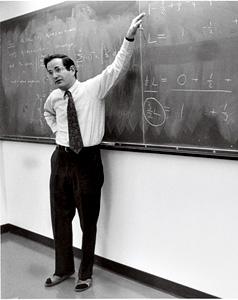 Norton Starr retired after 43 years at Amherst. |
Norton Starr, the Brian E. Boyle ’69 Professor of Mathematics and Computer Science, has retired after 43 years at Amherst.
Starr came to Amherst from MIT, where he earned a Ph.D. in mathematics, served as an instructor and received the Goodwin Medal for “conspicuously effective teaching.” In his early years at Amherst, he remembers, there were pitchers of milk and unleashed dogs in Valentine, nearly every professor lived within blocks of campus, and he once felt out of place for wearing a sweater rather than a coat and tie to a faculty meeting.
Named a full professor at Amherst in 1978, Starr has taught courses in advanced calculus, complex variables, probability, statistics and data analysis, among other subjects. He also taught a first-year seminar in computers and society. His most frequently cited publication is an article about the 1970 Vietnam draft lottery, published in the Journal of Statistics Education in 1997. In recent years, he has published on mathematical puzzles.
During a 1972-73 sabbatical at Canada’s University of Waterloo, he chanced into the young field of computer graphics and created a wide variety of computer drawings based on mathematical themes. A number of them have appeared in books and magazines. In 1989, he displayed his work Experiment in Shading, drawn by a ball-point pen under computer control, and Tecumseh, a lithograph of a graph-theoretic drawing made by computer-controlled fountain pen, as part of an invited exhibit at The Print Club in Philadelphia. Tecumseh had previously been displayed in the juried National Prints and Drawings Exhibition at Mount Holyoke in 1976. Most recently, Tecumseh appeared in a 2007 exhibit at Kunsthalle Bremen, where it is in the permanent collection.
When the math department moved to the Seeley Mudd Building in 1984, Starr could have picked an office with a view of the Holyoke Range. Instead, he chose a room facing the Quad, where students who walked by in the evening could see his light on and know he was available for questions.
This summer, Starr spent weeks clearing out that office, including 50 years of files and nine bookcases full of books. (The files include articles about nonacademic careers for philosophers and a list of at least 22 alumni who believe they were taught by him when, in fact, they were in none of his courses.)
In retirement, Starr will continue to write for a column in the College Mathematical Journal. “I look forward to simply being able to read a book, walk into town, see a movie,” he says. First, though, he must organize the papers and files that now overwhelm his house. Once he accomplishes that task, he says, he’ll feel retired.
Photo by Frank Ward